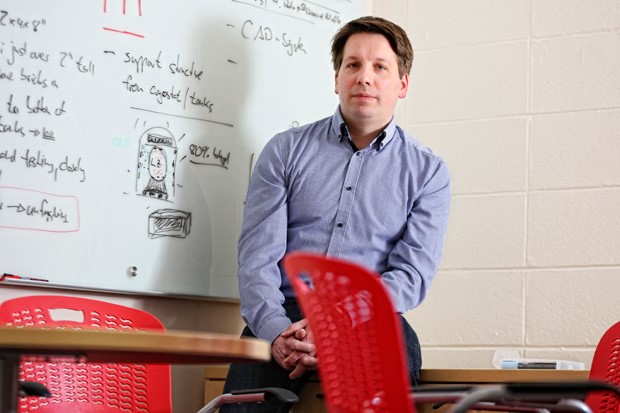Meet our new faculty member: Assistant Professor of Physics Bjoern Penning
Penning knew from an early age he wanted to study astrophysics. Now he searches for dark matter, a mysterious substance that makes up 80 percent of the mass of the universe.
 Photo/Mike Lovett
Photo/Mike LovettBjoern Penning
As part of our series profiling new professors, Bjoern Penning talked with BrandeisNOW about his field and research.
BNOW: How did you become interested in your field/research area?
Penning: I have been interested in physics and astrophysics for almost as long as I can remember. Back in elementary school, I started doing astronomy in my backyard, and later in high school, I read popular books about cosmology and particle physics. Despite a brief flirtation with medical school, it was always clear to me that I would go on to study physics. During my doctorate and postdoc years, I worked in collider physics, in particular on the hunt for the Higgs boson particle. After the discovery of the Higgs, I turned towards searches for dark matter that connect both particle physics and astrophysics.
BNOW: What was your favorite course as a college student?
Penning: I majored in physics with minors in math and computer science. I most enjoyed the courses that involved actual research and computer science. The latter served me particularly well because graduate work in science requires coding and data analysis.
BNOW: What has been your proudest career moment so far?
Penning: That’s easy. The academic job market is quite competitive, and when I got my offered my first permanent job as an assistant professor at the University of Bristol in England, I was quite proud. I knew then I was good enough to make it and pursue my passion in research over the long term. I was lucky of course.
That said, there were many other moments where I felt proud of the achievements of my colleagues and myself. For example, the Higgs discovery and the recent discovery of gravitational waves and neutron star mergers to which I happened to have a front-row seat.
BNOW: What specific question/project are you most excited to explore in your work at Brandeis, and why?
Penning: I am focusing on a comprehensive dark matter research program. The experimental focus is on the LUX-Zeplin (LZ), the world’s most sensitive direct dark matter search. LZ also involves phenomenological research to identify optimal models and searches for dark matter and combine them with results from collider physics to lay the groundwork for the development of future detectors.
BNOW: What book would you recommend to introduce others to your field?
Penning: Daniel Whiteson and Jorge Cham's "We Have No Idea: A Guide to the Unknown Universe" is a great book explaining the biggest questions in fundamental physics with funny illustrations by Jorge, the author of PHD (Piled Higher and Deeper) Comics.
BNOW: What's your favorite book/movie/television/radio program/podcast or hobby unrelated to your field, and why?
Penning: I go running regularly and enjoy live music and the arts a lot. The former relaxes me, the latter balances all of the science in my mind. I am also interested in politics and go skiing, time permitting. My Kindle is my faithful companion, and you’ll find plenty of science fiction or thrillers on it.
BNOW: What has surprised you about Brandeis since you came to campus?
Penning: The Brandeis students' reputation precedes them, but experiencing their enthusiasm and quality first hand is great. Similar to other faculty and the university administration. I feel Brandeis is a place where I can spread my intellectual wings, and I am looking forward to doing great science here.
BNOW: What advice do you have for students who are interested in your field?
Penning: Recent breakthroughs have really opened up the fields of collider physics and astrophysics, and there is no dearth of interesting topics to work on. Just a few years ago when I finished my doctoral degree, collider physics and astrophysics were quite separate topics. Now just a few later, we can pursue often the same questions using both colliders and telescopes. For example, dark matter, neutrino properties, the universe's matter-antimatter asymmetry — I am convinced answers to some of these problems are just around the corner. Others will require experimental and theoretical approaches no one has thought of yet. Hence curiosity, an open mind and hard work are the characteristics a student should have.
BNOW: Anything you'd like to add?
Penning: I am always happy to learn about other work at the university and to explain my work to others. There is also room for collaboration on new technologies with computer science or working with researchers in engineering and physical chemistry. So if someone is interested in exchanging ideas, please get in touch.
Categories: Research, Science and Technology





